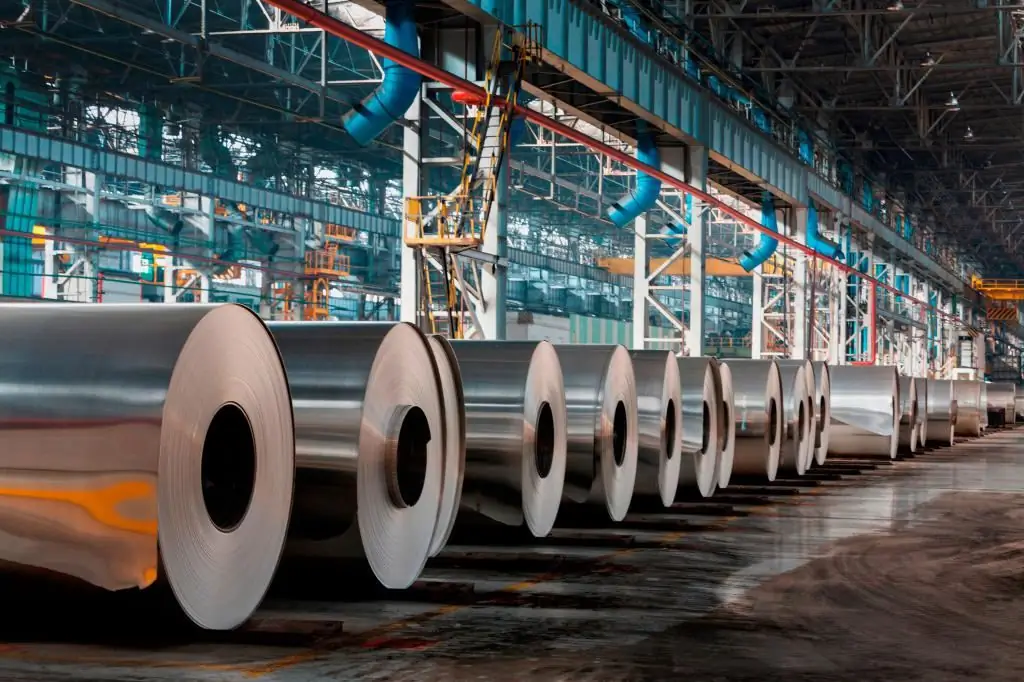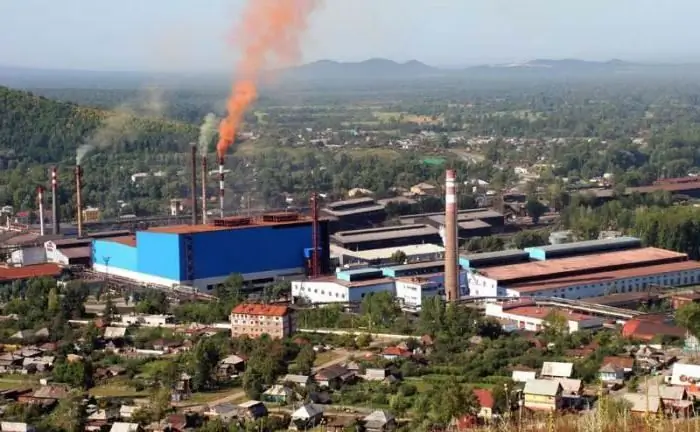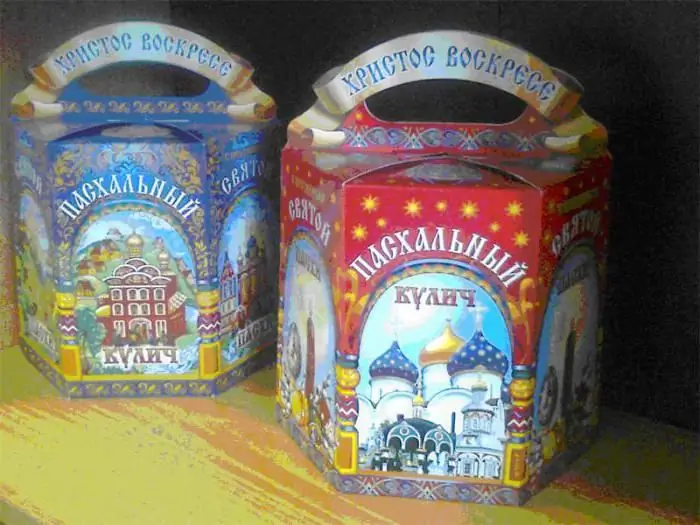2026 Author: Howard Calhoun | [email protected]. Last modified: 2025-01-24 13:10:26
Chelyabinsk Metallurgical Plant is part of the Mechel holding and is one of the country's largest enterprises in its industry. The formation of the plant took place in wartime, and today its products are in demand in almost all sectors of the Russian economy.
Bakal ore
The Chelyabinsk Metallurgical Plant was built in the basin of the Bakalskoye deposit. For the first time, ore was discovered, according to some surviving information, by Peter Ryabov in 1756. Siberian merchants Tverdyshev and Myasnikov took up the development of the deposit. Before 1900, minuscule minerals were mined, the total number did not exceed 2 million tons, while siderite ore reserves were estimated at one billion tons.
The first wave of industrialization came under the tsarist rule, and over the next 14 years, the pace of development of the deposit accelerated, by 1914 production amounted to 2 million tons. In the same period, plans for the construction of several metallurgical plants appeared, for which geological exploration was carried out. The historical events of subsequent years did not allowdevelop an idea.

Protracted construction
In the early 30s, the Soviet government introduced an industrialization plan, the main core of which was heavy industry and the military complex, of which the Chelyabinsk Metallurgical Plant was to become a part. The history of construction began with a corresponding decree, which was published in May 1930. According to the plans, the enterprise was to produce special heat-resistant steels, including those with alloying additives, which corresponded to the needs of the domestic market.
For some time, the process of choosing a site for the plant slowed down the construction, the laying took place at the Pershinsky site in 1934, and the next year the object was frozen. One of the reasons was the lack of equipment, the industry of the USSR was not yet able to fully provide a full range of machines, and there were no funds for the purchase abroad. All work was stopped before the start of World War II.

All for the front
Almost before the outbreak of hostilities, it was decided to resume construction work. After the commissioning of the first stage, the Chelyabinsk Metallurgical Plant was supposed to produce 600 thousand tons of pig iron and 150 thousand tons of steel from five electric furnaces. The issue with the lack of equipment was resolved with the evacuation in October-November 1941 of the metallurgical plants (Alchevsk, Stalingrad, Zaporizhstal, Novolipetsk).
The first stage of construction was commissioned in record time, it took only nine months from the moment the first cubic meter of concrete was poured to the production of the first ton of metal. By 1945, the production of iron and steel reached the planned volumes, for the entire time of the war, the Chelyabinsk Metallurgical Plant smelted 300 thousand tons of pig iron, 145 thousand tons of steel, 105 thousand tons of rolled metal. In a short period, the company installed and launched a full cycle of metallurgical production, including:
- Five electric arc furnaces.
- Two coke batteries.
- Two blast furnaces.
- Two rolling mills.
- Heat and power plant.

Post-war years
In peacetime, the importance of industrial enterprises did not decrease, and over time, the Chelyabinsk Metallurgical Plant became the leader in the supply of steel for the defense industry, high-tech industries, but peaceful tasks also appeared. The restoration of the destroyed economy, the residential sector required new materials, to ensure them, the company mastered several types of relevant products:
- High quality grade metal.
- Stainless sheet two types of skating (cold and hot).
- Heat-resistant steel forgings.
- Special steel forgings.
Also, the Chelyabinsk Metallurgical Plant mastered new production technologies:
- Smelting ageless steels.
- Production of lead steels.
- Productiontransformer steel according to the sulfide option.
- Metal melting technology in plasma-arc furnaces.
- Refractory metal rolling and more.

Transformation stage
In the post-perestroika period, the Chelyabinsk Iron and Steel Works went through a difficult period of transformation. The enterprise managed not only to survive, but also to expand due to the production of mass-produced metal products. There were plans to eliminate several cycles, which ended in a successful upgrade. Instead of energy-intensive open-hearth production, new electric arc furnaces, continuous casting plants and other equipment were installed.
In 2001, the Chelyabinsk Metallurgical Plant (Chelyabinsk) became part of the Mechel Group, which led to a large-scale modernization focused on the use and implementation of innovative technologies at all stages of production. By 2004, blast furnace No. 1 was modernized, resulting in an increase in working volume to 2030 cubic meters (was 1719 cubic meters), and productivity increased to 1.5 million tons of pig iron per year (was 1 million tons). An electronic monitoring and control system was also installed, which allows monitoring all processes in real time. In addition to this production, new equipment was delivered to electric steel-smelting shops No. 2 and No. 6, a heating plant, an oxygen-converter shop, a small section mill 250, etc.
To date, modernization has been carried out in the main workshops and production lines. In 2013, the mill forproduction of high-quality shaped steel and rails up to 100 meters long. The full cycle production capacity is 1.1 million tons of products per year. The main deliveries are carried out within the framework of the program "Strategy for the development of railway transport", calculated until 2030. In 2014, the products successfully passed the certification procedure.

Prospects
Development plans at the enterprise are associated with promising areas of metal consumption in the domestic market, which requires further technical and technological modernization. The main requirement of modern production is the rejection of energy-intensive equipment, for which the Chelyabinsk Metallurgical Plant purchases new lines for the steel casting shop, implements a project to upgrade the slab caster, and builds two new complexes for out-of-furnace metal processing.
The plans for the development of Russian industry announced the implementation of large infrastructure projects in engineering and construction. In order to adequately occupy a niche, the Chelyabinsk Metallurgical Plant (Mechel) is building a universal mill, modernizing the equipment of rolling shop No. 4, the result of the work should be a planned increase in capacity to 1.1 million tons of finished products per year, and purchasing additional equipment for the stainless steel rolling shop.

Products
Chelyabinsk Metallurgical Plant produces:
- Hot rolled bars.
- Castbars.
- Hot-rolled and cold-rolled stainless steel sheets.
- Hot-rolled steel sheets.
- High strength steel sheets.
- Reinforcing steel grades A1 to A5.
- Angle steel.
- Rod wire.
- Rolled rod for the production of welding wire.
- Tube blanks (rolled 80-180 mm, forged 80-180 mm).
- Square rolled and forged blanks.
- Commodity cloak.
- Slabs.
- Rolled and forged strips, including shaped strips.
- Hexagons.
- Assortment of forgings.

Environment and Social Policy
JSC "Chelyabinsk Metallurgical Plant" pays much attention to environmental protection, for which the work of a specialized service of the plant has been activated. The enterprise controls the amount and content of harmful emissions into the atmosphere, monitors the impact of the industrial environment on water resources and the air basin.
The environmental protection program has been implemented in the company since 2007, which gave a tangible result in reducing the negative impact. The number of discharges into water bodies has been reduced by half, emissions into the atmosphere have decreased. Technically and morally obsolete equipment is decommissioned, which reduces the risks to nature. At the second stage of the reconstruction of the plant, the cost of environmental protection will amount to more than 3 billion rubles.
Chelyabinsk plant is one of the few who have preserved social facilities, the mainwhose task is to provide rest, leisure and medical care for the plant personnel. Several recreation centers, dispensaries, Palaces of Culture, a sports complex, and children's camps remain on the balance sheet of the company, and all employees can use them. A lot of attention is paid to professional training and career growth for everyone who wants to connect his life with the plant.
Official information
In September 2016, ChMK received a new director, Anatoly Petrovich Shchetinin, for whom the plant is a native enterprise. Here he began his career as a foreman of the bottling shop, and since 2001 he worked as a deputy head of the Chelyabinsk Metallurgical Plant OJSC, after which he changed several managerial positions at the production enterprises of the Mechel holding. Has a PhD in Engineering.
Chelyabinsk Metallurgical Plant has the following address: 2nd Paveletskaya street, building 14. Phone: (3512) 24-46-61.
Recommended:
Metal structures plant, Chelyabinsk: history of creation, address, working conditions and manufactured products

The Chelyabinsk steel structure plant is one of the industry leaders in the production of structures for industrial and civil construction, as well as bridges. The range and quality of products made the company in demand in Russia and abroad
JSC "Ashinsky Metallurgical Plant": history, production, products

JSC "Ashinsky Metallurgical Plant" is a city-forming enterprise in the west of the Chelyabinsk region. AMZ is one of the top five Russian suppliers of thick plates, nanocrystalline and amorphous alloys. Leader in the production of tableware, household items and garden tools from stainless steel
Factory of bakery products "Dedovskiy Khleb": history, products, address

Dedovskiy Khleb bakery is known in the metropolitan area as a manufacturer of high quality bakery products. Loaves, "bricks", fragrant buns, Easter cakes, cakes, waffles are in constant demand among consumers. The key to success lies in the strict observance of GOSTs and technological standards laid down back in the 80s of the last century. Products are baked on modern equipment
Aleksinsky experimental mechanical plant: history of creation, address, management and products

In the north-west of the city of Tula, at a distance of 60 kilometers, stands the ancient city of Aleksin. It is located on the opposite banks of the Oka at the confluence of the river Mordovka. It is a large industrial city of the Tula region, which experienced its second birth during the first five-year plans of the USSR. Aleksinsky Experimental Mechanical Plant (AOMZ) is located in this city, which has a rich history
PJSC "Nadezhda Metallurgical Plant" (metallurgical plant named after A. K. Serov): address. Ferrous metallurgy

PJSC "Nadezhda Metallurgical Plant" is among the top ten domestic producers of rolled steel. In addition to steel, the company produces cast iron, manufactures concrete and reinforced concrete structures. NMZ is located in the north of the Sverdlovsk region, in the city of Serov

